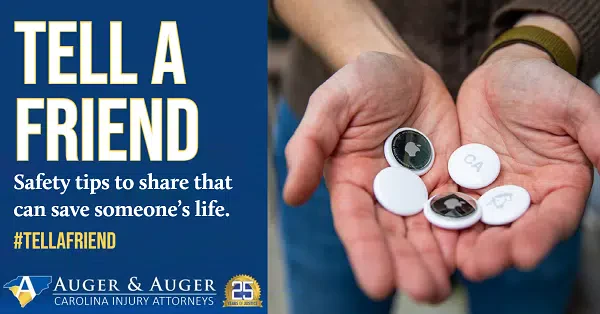Carolina State Officials Warn of How Apple AirTags are Being Used to Stalk People
Author: Auger Law | April 26th, 2022

Last year, Apple unveiled their new AirTags, small, coin-sized tracking devices designed to help people keep track of personal items, such as keys, wallets, purses, backpacks, and luggage. However, in recent months, there have been multiple reports of AirTags being used to stalk and track people.
“Criminals will place Apple AirTags in people’s purses if they’re not watching them. They’re so small that they can easily be placed anywhere,” says Bailey Parker with the South Carolina Department of Consumer Affairs.
Across the Carolinas, alarming reports of AirTag misuse are emerging. A North Carolina college student reported finding an AirTag in her backpack. One report made to the Charleston County Sheriff’s Office shows a woman found an AirTag under her car on Johns Island. Another incident was reported to the Charleston Police Department where a young woman found an AirTag in her purse after going out with friends the night before.
How do Apple AirTags work?
Apple AirTags are $30 wireless devices that can help you keep track of things or locate lost items. The concept is fairly simple: you attach an AirTag to a key chain, backpack, or other personal property. The AirTag then broadcasts a Bluetooth signal that can be detected by nearby devices. These devices then share the location of the AirTag, allowing you to track where your property is located.
The technology seems harmless—and even useful—but police departments in the Carolinas have started receiving reports of unwanted tracking or stalking using the devices.
How to protect yourself from being tracked
Apple has built-in certain protections to discourage unwanted tracking, but it’s still possible for someone to slip an AirTag into your bag or car without your consent and track your location.
AirTags have two main anti-stalking features:
- First, you’ll be notified when an unknown AirTag or Find My accessory is found to be traveling with you over a period of time if you have an iPhone with iOS 14.5 or later.
- Second, if an unknown AirTag is away from its owner for a long time (Apple doesn’t specify how long but says between eight and 24 hours), it’ll play a chime-like sound when it’s moved so that the AirTag can be found.
How to find, block, and disable an unknown AirTag moving with you
Here are a few tips to detect and disable unknown AirTags:
- Check pockets: In clothing, purses, luggage, messenger bags, and other items, unzip and feel for an AirTag that’s been placed or sewn in.
- Examine a car: A car may have a number of locations that are unreachable or hard to check. These are ideal places for AirTags.
- Check packages: Even if someone doesn’t have access to your home, work, school, or vehicle, and you don’t receive mail at the address at which you live—you might use a P.O. box or another person’s address—someone could ship you an item with an AirTag in it, and when you take that home, they could have your location. If you’re in that specific situation, you may need to examine all packages received elsewhere before bringing them home.
- Use Apple’s Find My app: The app can be used to manually scan for AirTags near you. If you download the app now, you can set it up to automatically notify you when an AirTag is detected near you.
Apple AirTags, like many categories of personal technology, have costs and benefits. While the convenience of always knowing the location of your valuable property is significant, there is a dark side to this device’s tracking ability. Regardless of whether you use these devices or not, it’s important to know how to detect and disable this technology in case it’s being misused.
Do your part, #TellAFriend
Help keep your friends and family safe by sharing these safety tips. As part of our #TellAFriend safety campaign, Auger & Auger shares quick tips to educate people on everyday dangers and lesser-known safety tips. Sharing these posts could potentially save someone’s life.
Be sure to follow us on Facebook to receive the latest updates.














